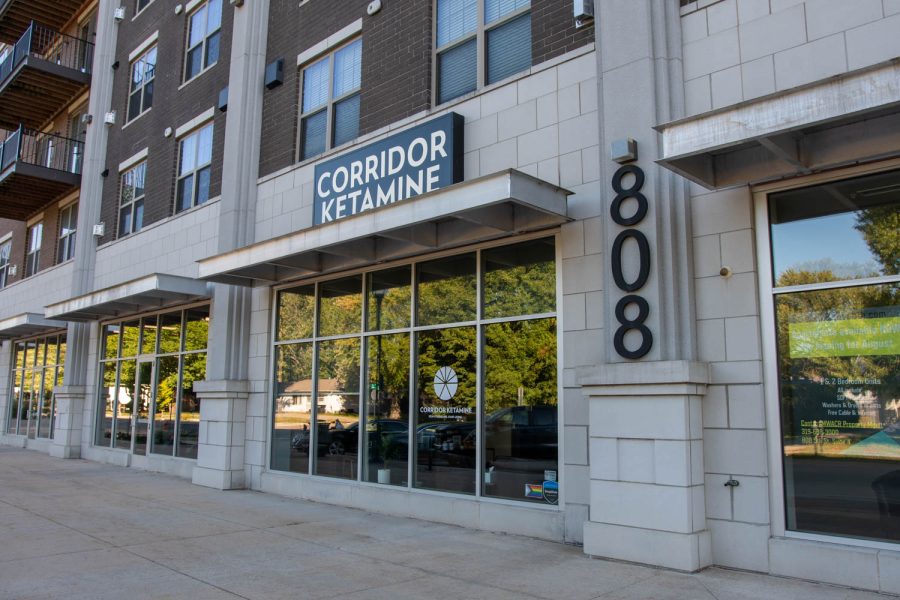Coralville clinic opens to provide alternative therapy for treatment resistant depression
Corridor Ketamine offers Spravato and IV ketamine therapy to patients with depression whose traditional antidepressants failed. Co-owners Trent Sassman and Beth Westermann opened the Coralville clinic to patients in July.
Corridor Ketamine Mental Health Clinic is seen at 808 5th St. in Coralville, Iowa, on Wednesday Sept. 28, 2022
October 2, 2022
Corridor Ketamine in Coralville provides ketamine therapy as an alternative antidepressant to patients who suffer from treatment-resistant depression.
Workers at the clinic started administering ketamine as an alternative to traditional antidepressants in July, citing a need in the psychiatry community for a safe and comfortable environment where patients can get the help they’ve been looking for after other options have failed.
According to Avesta Ketamine and Wellness, Yale studies in the 1990s found that ketamine can be used as an antidepressant because it prompts the brain to form neural connections, allowing the patient to develop more positive thoughts and behavior.
Additional studies in the early 2000s confirmed this finding, and ketamine use in the mental health industry has since rapidly expanded. The Federal Drug Administration approved esketamine in 2019, a drug used for treating major depression that is commonly known by the brand name Spravato.
Corridor Ketamine co-owner Trent Sassman said the facility provides Spravato, which is administered through the nose, and as IV ketamine, which is infused over a period while the patient is monitored.
Sassman said both methods are provided only for treatment-resistant depression because the most evidence supports that use. Ketamine therapy provides almost immediate relief, he said.
“It’s also nice in that traditional antidepressants can typically take several weeks to months before you start seeing a positive benefit from them,” Sassman said. “Ketamine, if it’s going to work for you, tends to function much faster so that patients don’t have that lag time between starting treatment and starting to feel better.”
To provide Spravato, the facility is certified under the FDA’s Risk Evaluation and Mitigation Strategy program. They also work with insurance companies to get credentials with local carriers.
Sassman said he and his co-owner Beth Westermann are nurse anesthetists, not mental health care providers, so they strive very hard to work collaboratively with providers.
“[For] every single patient that we take care of, we require a referral from their mental health provider if they’re going to be receiving Spravato, or their primary care provider if they’re going to be receiving IV ketamine,” Sassman said. “These providers have long-standing relationships with these patients and have a lot more insight into their life that we might not necessarily have, so we work very diligently to strengthen those relationships as a collaborative effort to help provide this care to the patient.”
Sassman said Corridor Ketamine’s goal is to increase access to care.
“IV care can be very cost-prohibitive to a lot of patients, so we have taken on providing Spravato, which is insurance-reimbursable,” Sassman said. “There’s quite a backlog of patients that are seeking this service but previously have been unable to receive it in close proximity to home.”
RELATED: Different groups of people come forth about mental struggles and barrier to treatment
Sassman said they opened Corridor Ketamine because of the high health care costs for treating depression and because depression’s prevalence as a mental health issue is starting to be recognized.
“There’s always that desire to feel good in general and not feel those depressive symptoms,” Sassman said. “We definitely feel like Spravato could potentially help get people back to feeling normal and not having the depressive cloud sitting over top of them throughout their life.”
Sassman said there is a stigma that ketamine is a street drug that can be used inappropriately, which is why the treatment needs to be provided in a monitored environment like the one at Corridor Ketamine.
“Ketamine, when it’s used in an appropriate setting by a qualified healthcare provider, can be a very effective drug in bringing benefit to patients,” Sassman said. “[We’re] making sure it’s not going to be another opioid crisis or anything and that it is yielding positive benefits.”
Sam Jarvis, Johnson County Public Health community health manager, wrote in an email statement to The Daily Iowan that Johnson County Public Health has minimal insight into the use or demand of therapeutic ketamine.
“We do not permit or regulate that at the local level,” Jarvis stated. “[I] imagine, like other medical practices, it’s on the provider to be licensed, credentialed, et cetera to perform.”
Ketamine therapy, however, is offered at the University of Iowa.
Mark Niciu, UI assistant professor of psychiatry, does research and clinical works with ketamine. He is a physician at the UI Hospitals and Clinics interventional psychiatry service where ketamine is one of the therapies offered.
Niciu said ketamine therapy in Iowa began in Cedar Rapids and Des Moines but is now offered at Midwest Ketafusion in Iowa City and Corridor Ketamine in Coralville.
“I can guarantee there’s a handful of people who are doing it now, and it wasn’t like that when I started here,” Niciu said. “It definitely got more popular all throughout the country.”
Niciu said providing ketamine therapy swiftly is crucial, especially for patients with suicidal thoughts.
“A lot of cases might have suicidal thinking,” Niciu said. “We want more rapid treatments in those patients for certain.”
As facilities like Corridor Ketamine continue to rise across the country, Niciu said oral ketamine and ketamine-like compounds are the next steps for ketamine therapy because they can be taken at home and reduce antidepressant side effects and risk of addiction.
“I’m glad there’s more interest in the field, and I think the biggest advance that I’ve seen in twenty years practicing psychiatry is the approval of Spravato,” Niciu said. “I think it’s a really groundbreaking approval for novel antidepressants, so it’s an exciting time to be in psychiatry.”















